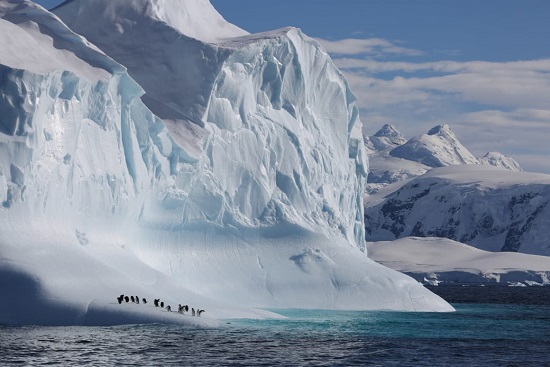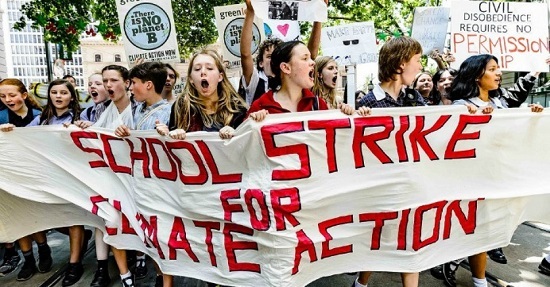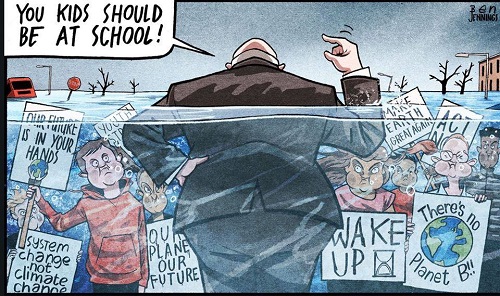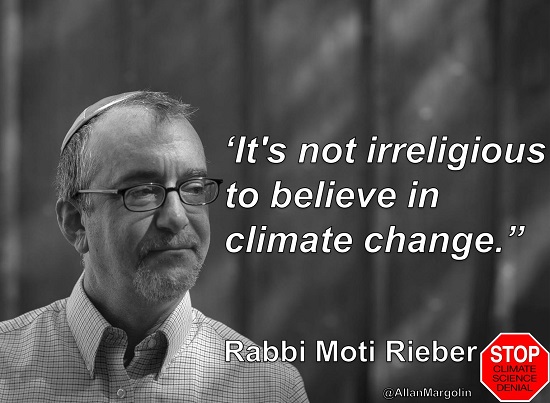
Story of the Week... Opinion of the Week... Toon of the Week... SkS in the News... SkS Spotlights... Report of Note... Coming Soon on SkS... Climate Feedback Reviews... SkS Week in Review... Poster of the Week...
As someone who loves traveling and going outdoors, I struggle with balancing my hopefulness and my despair — and my culpability — regarding an imperiled earth.

A couple weeks ago, I made the mistake of watching Netflix’s new documentary series Our Planet after hitting a friend’s weed pen. Even though I knew that famed naturalist David Attenborough’s latest project aimed to explicitly address the effects of climate change, I was still expecting to (mostly) enjoy a big, splashy nature doc, letting myself become fully immersed in the overwhelming beauty and vastness of life on Earth — especially since, someday all too soon, many of these glorious scenes will be lost to us.
What I didn’t expect were the horrors awaiting me at the (now-infamous) end of Episode 2. A huge group of walruses congregate on a tiny stretch of land because they can’t gather on swaths of Arctic sea ice that no longer exist. Forced to find space from the crowd, some of the poorly sighted animals climb up steep cliffs — then, sensing other walruses below, fling their bodies off the edge. Somehow I’d missed all the coverage of Netflix’s warnings to animal lovers about this particular moment. Even if I had, I don’t think anything could have prepared me to see these gentle, gigantic animals tumble to their deaths. I started to weep; I think being stoned could only partially account for my spiral.
Reckoning With Personal Responsibility In The Age Of Climate Change by Shannon Keating, BuzzFeed, Apr 27, 2019

The fossil fuel industry’s decades-long campaign to build political power and spread disinformation about climate change is well-documented. It has long kept the American public in the dark and elected leaders in their pocket. Their strategy of denying the causes of climate change has been wildly lucrative for the fossil fuel industry, but devastating for our environment and democracy.
As kids across the U.S. and around the globe rise up to demand action, this disinformation campaign is now being targeted at America’s classrooms.
A spate of bills introduced in states across the country would either prohibit teachers from discussing climate change in their classrooms or require public school teachers to present “both sides” of an issue that has come to dominate American political discourse. This would give science equal weight with flat-out propaganda.
The Climate Change Generation Needs to Know What's Coming, Opinion by Michael E Mann, Newsweek, Apr 24, 2019

Willard MacDonald? article, It’s Easy to be Tricked by a Climate Denier (Medium, Apr 20), debunks claims made in Gregory Wrightstone's book, Inconvenient Facts and is a neat example of debunking done very well. The article references the consensus studies and the SkS homepage.
"Wrightstone attacks the often-quoted statistic that 97% of climate scientists agree that global warming is man-made. This 97% number comes from a number of studies, including one by Cook et al which looked at the abstracts from 11,944 peer-reviewed papers related to climate change over 21 years. They identified 4,014 papers that stated an opinion about whether climate change is man-made or not. 3,898 said it is man-made. The study correctly calculated 3,898/4,014 x 100 = 97%. Wrightstone’s complaint about this study is that the 7,930 papers that made no statements about whether climate change is man-made or not were not included in the 97% calculation. His argument is that the researchers should have counted these in the denominator of the % calculation, and so the number should be 3,898/11,944 x 100 =32.6%.
This is not a valid way to tally opinions. If you are trying to report the number of people who have opinion A vs opinion B, you take the total number who have opinion A and divide it by the total number that stated either opinion A or B. If there was no opinion stated, then it is not part of the statistic.
Other similar studies have been done by numerous scientists with similar results to the Cook et al result from 2015. See the image below from Skeptical Science."
Towards the end of his article MacDonald references the SkS homepage:
"The motivating forces behind climate denial are most certainly from the fossil fuel industry. Climate denial has become a formula, and the people and institutions spreading this false information recycle the same arguments over and over again. Skeptical Science does a great job cataloging and debunking these myths. The home page includes the image to the left showing the top 10 most used myths. You’ll recognize many of them from the analysis of Wrightstone’s book."
EndClimateSilence.org is a volunteer organization dedicated to helping the media link stories about climate-change impacts to climate change itself. Mobilizing through digital activism, we focus on all media platforms —from television networks to print outlets to online content providers to radio programs. We are motivated by the awareness that climate change poses a grave danger to humanity and we must transition from fossil fuels to safe energy immediately in order to preserve a planet that supports civilization. We see that climate change has begun to hurt people, and it's the media's job to report on that fact.

Scientists and government officials meet this week in Paris to finalise a key assessment on humanity's relationship with nature.
The Intergovernmental Panel for Biodiversity and Ecosystem Services, or IPBES, will issue the first report of this type since 2005.
It will detail the past losses and future prospects for nature and humans.
One author says the report will highlight the "social and ecological emergency" the world is now facing.
From Monday some of the world's leading researchers in the field of biodiversity will meet in the French capital to work through the details of their report with representatives from 132 governments.
Their conclusions, known as a Summary for Policymakers, will then be published on 6 May.
Nature loss: Major report to highlight 'natural and human emergency' by Matt McGrath, Science & Environment, BBC News, Apr 28, 2019
[To be added.]

Posted by John Hartz on Sunday, 28 April, 2019
 |
The Skeptical Science website by Skeptical Science is licensed under a Creative Commons Attribution 3.0 Unported License. |